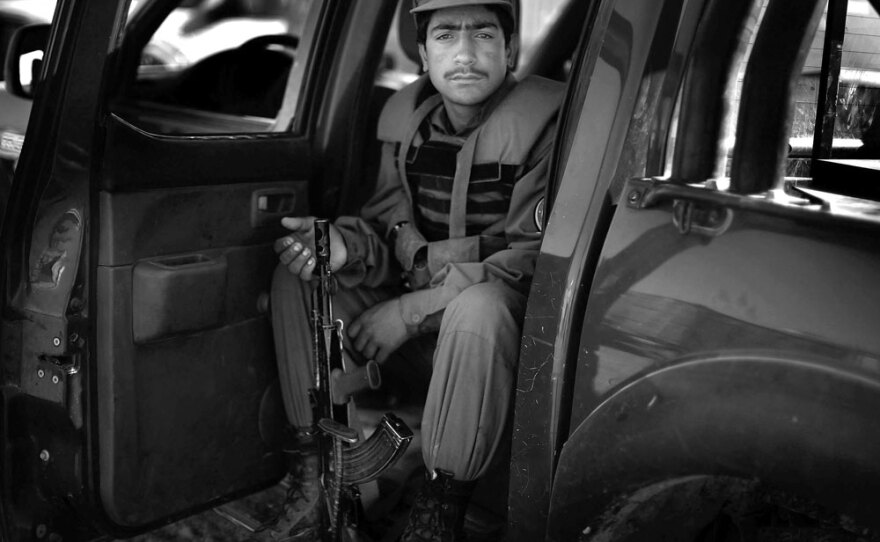July has been the deadliest month for the U.S. military in Afghanistan since the war began in 2001 — with at least 39 service members killed. NPR's Pentagon correspondent, Tom Bowman, who recently spent more than a month with U.S. forces in the country, talks to Steve Inskeep about the reasons behind the spike.
Steve Inskeep: What is making Afghanistan more dangerous now?
Tom Bowman: Well, there are two reasons, really: There are a lot more U.S. troops heading into Afghanistan, and they're also heading into areas where the Taliban is resurgent and dug in — and where there really have not been any Afghan or foreign troops in years. We were in Helmand province with the Marines, and that's a Taliban stronghold in southern Afghanistan, and the Marines fanned out into the Helmand River valley, setting up combat outposts. And while we were there, several of those Marines were killed.
And this is an area where in the past, the U.S. or other forces would not have even contested?
Absolutely. It was, again, a Taliban stronghold and also a source of their cash crop, poppies, that are turned into heroin, the lifeblood of the Taliban by some estimates — allows them to buy weapons and also pay Afghan civilians.
Now, when you look at these dozens of deaths, what patterns do you see — American deaths?
Well, most of them are killed by roadside bombs. It's the most serious threat now in Afghanistan, just as it was in Iraq. At least half the Americans died from roadside bombs in Afghanistan. The officers I talked with over there said they're really worried about this, and they believe the number of these bombs will grow throughout the summer. They're finding a lot of caches of bomb-making materials, including homemade explosives that use fertilizer. And these are also difficult to detect because they have very little metal, so metal detectors in some cases won't pick them up. So Marines are using dogs to actually sniff out some of those components.
So a lot of these are roadside bombs, and, if I'm not mistaken, a lot of them are outside of that southern Afghan area where the heaviest fighting has been.
That's right. They're throughout the country — in the outskirts of Kabul; along the eastern part of Afghanistan, hard up against the border with Pakistan, where you're seeing a lot of the Taliban fighters come across the border — so really all over the country. But, again, in the southern part of Afghanistan, where a lot more U.S. troops are heading, they're finding a lot more caches of bomb-making equipment, and they expect this area to have a lot more roadside bombs in the coming weeks and months.
What about the Afghans who are fighting alongside the Americans in many cases?
There are even greater casualties among the Afghans, especially the police. There are estimates that the police are losing as many as a company of men each month — that's about 140. Now, the Afghan police are seen as what is known as a soft target because they have little armor or weaponry. And when I was in Helmand province, I heard a bomb explode one night. As it turns out, that explosion wounded seven Afghan policemen, two of them seriously. And the next day, we saw their Ford Ranger, and it was just a tangled mass of metal.

Tom, I'm thinking about a different kind of casualty: civilian casualties. Because in recent months, the top American general for forces in that region, Gen. David Petraeus, has focused very much on limiting or eliminating civilian casualties for many reasons — one of them being that it undermines the effort to win over the Afghan populace. How is the U.S. military doing in limiting those casualties?
Well, a lot of this is caused by U.S. forces calling in airstrikes, and that's caused a lot of these civilian casualties. So they're going to try to limit the number of airstrikes. And, again, we were with the Marines out in southern Afghanistan. What they're trying to do is, rather than call in airstrikes, what they plan on doing is circling a building or a house that has Taliban in it and just kind of waiting them out, rather than immediately going to airstrikes.
Does that increase the risk for American forces on the ground, that they don't use this weapon they have in the air?
There's no question it probably increases the risk to Americans on the ground. But they say the most important thing for them is to protect the civilian population.
Copyright 2022 NPR. To see more, visit https://www.npr.org. 9(MDAzMjM2NDYzMDEyMzc1Njk5NjAxNzY3OQ001))






